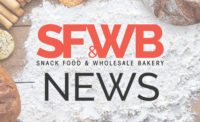Who Wants to Be a Billionaire?
By Dan Malovany
Who wants to be a billionaire?
Flowers Foods does. Actually, make that around $2 billion in annual sales or above. That’s the guidance the Thomasville, Ga.-based company gave analysts for its 2007 fiscal year.
Flowers Foods has been one of the darlings of the investment community for the last few years. Earlier this year, Forbes magazine’s editors named it the “best-managed” food company among the 400 best big companies in America.
Talk about dancing with the stars.
In May, Flowers once again reported record sales for the first quarter of fiscal 2007. In June, with its stock trading at or near record levels, the company’s board declared a three-for-two stock split by means of a 50% stock dividend. It also increased the quarterly cash dividend by 50%.
“Since the spin-off of Flowers Foods in 2001, our company has invested more than $650 million to build shareholder value,” notes George E. Deese, chairman, CEO and president. “Those investments include capital projects to improve efficiencies and add strategically located production capacity, six acquisitions that enhanced the company’s reach in the marketplace and share repurchases.
As a result of these investments and our operating strategies, Flowers Foods’ market capitalization grew from $400 million at the time of the spin off of Flowers to just over $2 billion on May 31, 2007. In addition, since the spinoff in 2001, Flowers has paid $97.7 million in dividends shareholders.”
During the past year, Flowers continued to expand its geographic territory. Recently, for instance, the company began serving the Texas panhandle. It now distributes its products throughout the entire state. In addition, Flowers just started up a bread line in its state-of-the-art Newton, N.C., plant, which also houses a bun line and serves markets as far north as Washington, D.C., and parts of Virginia. During the next two to three years, the company plans to strategically add production lines so that it can continue to be a low-cost producer and make products closer to market to reduce distribution costs.
For the first quarter, Flowers Bakeries’ branded sales
climbed 9.9%. And its powerhouse Nature’s Own brand sales grew by double digits, as did its direct-store-delivery sales for the bakery group.
Data from Chicago-based Information Resources, Inc. also indicate that the “overall bread category grew this quarter, and this is good news,” as Deese told analysts during Flowers’ quarterly Web cast in May.
In a recent interview with Snack Food & Wholesale Bakery magazine, Deese noted that annual sales of Nature’s Own products at retail range between $500 to $600 million. He credits the brand for being one of the anchors for the company’s success since it was introduced into the market in the 1970s. In the low-margin baking industry, Nature’s Own, as well as Flowers’ stable of other brands, including Cobblestone Mill and Whitewheat, has provided a solid platform for continued profitability.
“I believe in Nature’s Own,” Deese says. “Thank goodness for it. If we stayed strictly as a white bread baker, I guarantee you that we would not be here today.”
To further bolster the brand, the company introduced Nature’s Own All Natural premium bread products last year. The line includes an All Natural 100% Whole Wheat and an All Natural 100% Whole Wheat made with organic flour. Both have 24 g. of whole grains per slice or half the amount recommended by U.S. Dietary Guidelines. Other products in the new line include Honey Wheat made with organic flour, 9 Grain, 12 Grain and Honey Wheat Berry.
“Nature’s Own has been a growing part of our portfolio as a percentage of sales,” Deese notes. “Definitely, there is more margin than with other products and now, with the All Natural Nature’s Own, that just adds to that. We get a better yield and a better margin.”
To support the Nature’s Own brand, Flowers began advertising on cable stations nationally 18 months ago to create brand awareness as it expands distribution into new territories. The commercials are so popular that Flowers has put them on the Nature’s Own Web site. The company is continually updating its branded Web sites to reach a larger and diversified audience with information about its brands, products and new offerings. Nature’s Own also is supported by free-standing inserts, tie-ins with other products, consumer advertising and trade magazine advertising targeted at retailers.
Meanwhile, print advertising in regional publications such as Southern Living supports Cobblestone Mill, Flowers’ $75 million brand, which focuses on pumpernickel, sourdough and other special occasion breads and rolls.
Another star in its portfolio is Whitewheat, which made its debut in 1991. The product, which has the nutrition and fiber of whole wheat but the taste and texture of white bread, always has been a solid performer, but sales over the past few years have taken off. Although it’s not a whole grain product, Whitewheat has benefited from the whole grain phenomenon.
“In certain markets, Whitewheat is our No. 1 product,” Deese notes. “That’s not true companywide, but in markets that don’t have a strong white bread brand, Whitewheat will take the top spot.”
Although its product line is diversified, white bread still is Flowers’ top seller in most markets, partly because private label accounts for so much of sales and partly because it remains popular with children and families.
However, Deese sees consumers slowly transitioning to more upscale breads and rolls.
“Generally, as consumers get older, they switch to a soft variety of bread like Nature’s Own,” Deese explains. “As they continue to age or their economic situation develops, they begin purchasing more premium products like Nature’s Own All Natural premium. Many younger consumers today, however, are choosing Nature’s Own as a healthier alternative.”
And that’s his final answer.




